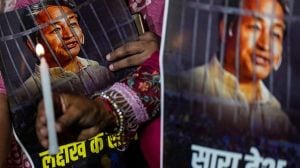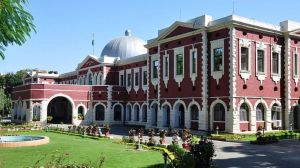Naidu gets Centre to do flip-flop on Krishna water dispute
NEW DELHI, FEB 22: Bowing to political compulsions, the Vajpayee Government has altered the Centre's stand on the inter-state Krishna wate...

NEW DELHI, FEB 22: Bowing to political compulsions, the Vajpayee Government has altered the Centre’s stand on the inter-state Krishna water dispute and is now toeing the Andhra Pradesh line.
In its submissions before a Constitution bench of the Supreme Court last week, the counsel for the Centre, in a reversal of its own stand, argued against giving effect to the Bachawat Tribunal’s award on the sharing of surplus waters among Andhra Pradesh, Karnataka and Maharashtra. As early as 1989, the Centre had written to the three states with exactly the same proposal it is opposing today. It had then asked the states to give their compliance for the setting up of a Krishna valley authority to implement “Scheme B” under which they were allocated individual shares of the surplus waters.
But now in a volte face, it is talking the same language as Andhra Pradesh where the Telugu Desam Party which is a major prop for the Vajpayee Government is in power. Andhra Pradesh, too, has opposed the implementation of “Scheme B” while making its submissions in the apex court. In fact, the Centre has gone a step further to suggest that the problem of sharing the surplus waters constituted another water dispute which necessitated the setting up of a new tribunal.
A new tribunal would only delay the resolution of the raging dispute between Andhra Pradesh and Karnataka on the Almatti dam and other issues relating to sharing of Krishna waters. The experience with tribunals has been far from happy as the one on the Cauvery dispute between Tamil Nadu and Karnataka would prove. Set up in 1989, the tribunal is still in the process of examining the witnesses with the final award nowhere in sight. Karnataka feels that if Scheme B is not given effect to, Andhra Pradesh whichis on the downstream will become the natural beneficiary of unused waters giving it the time to plan new projects. According to it, a new tribunal was uncalled for because the Bachawat tribunal had gone to the depth of the problem and framed a comprehensive scheme which also proposed a formula for sharing the deficit among the States in distress years.
The Centre’s counsel, Harish Salve, took pains to emphasise in the Supreme Court that the government was not siding with one state but opposed the implementation of Scheme B on three counts. One, the Bachawat tribunal had only made a proposal on Scheme B and there was no decision. Two, the SC has no jurisdiction to direct the Centre to enforce the scheme. Three, since over 20 years had lapsed after the tribunal had proposed the scheme it may not be in the interests of justice to implement it now.





- 01
- 02
- 03
- 04
- 05


























